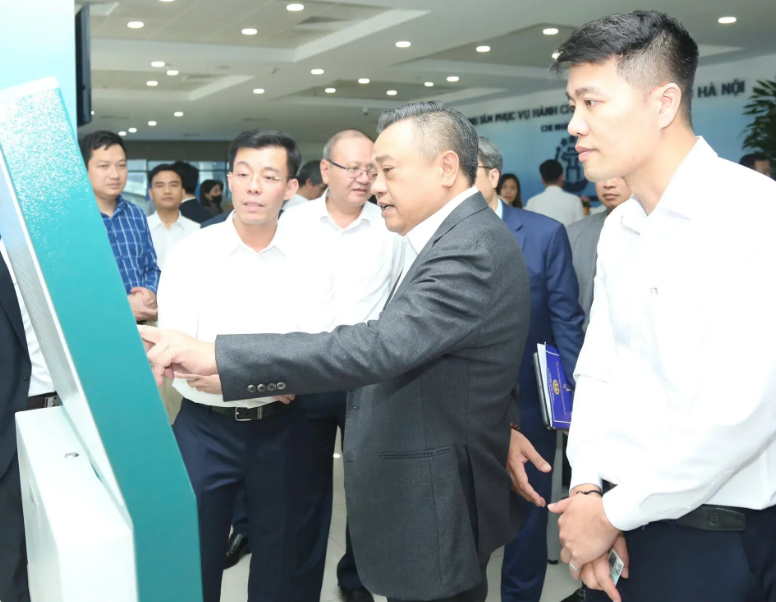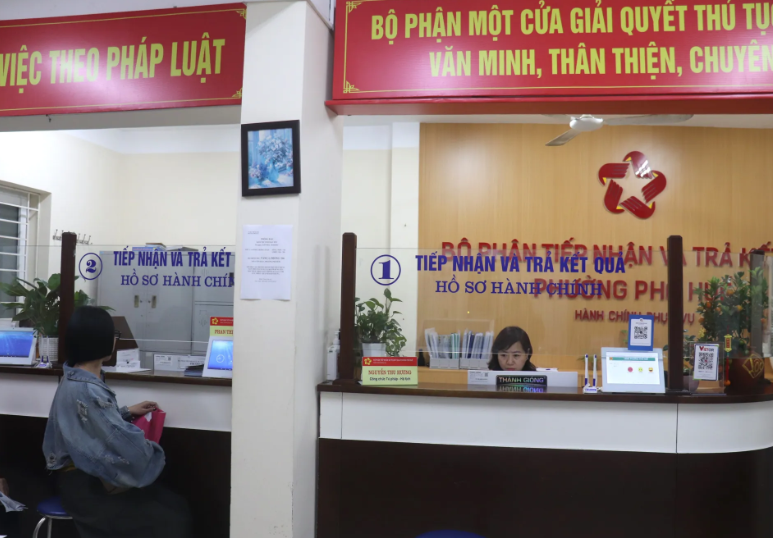Hanoi improves public satisfaction with administrative services
Hanoi plans to apply digital technologies to enable easy information retrieval, submission of documents, and tracking of results.
Hanoi People’s Committee has directed all city agencies and departments to improve the quality of administrative procedures in a bid to raise the city's Public Administrative Service Satisfaction Index.

Chairman of the Hanoi People's Committee Tran Sy Thanh during a visit to city's the Administration Service Center. Photos: The Hanoi Times
This information is presented in the report by the People's Committee of Hanoi analyzing the results of the 2024 Satisfaction Index of Public Administration Services (SIPAS) based on the nationwide index recently announced by the Ministry of Home Affairs.
The index of citizens' and organizations' satisfaction with public administration services is evaluated through two main components: the index of policy development and implementation, and the index of public administration service delivery.
In 2024, nine groups of public policies were selected to continue to be evaluated by citizens. These include policies on economic development, medical examination and treatment, general education, public order and safety, road traffic, household electricity, household water supply, social welfare, and administrative reform. In Hanoi, residents 18 years and older were surveyed through 2,700 face-to-face interviews.
The results show that Hanoi's 2024 Satisfaction Index has improved very positively thanks to strong commitment at all levels and sectors. The quality of administrative service delivery reached 86.5%, up by 2.93 percentage points over the previous year, and remained above the national average.
Hanoi ranked 11th out of 63 provinces and cities, moving up 10 places from 2023, and second among the six sub-national cities.
However, the 2024 SIPAS survey also revealed some shortcomings. In particular, "government accountability" showed the least improvement in the policy implementation index. Similarly, "access to services and bureaucratic procedures" showed minimal improvement in the service delivery index.
Citizen satisfaction with the criterion "better service by local public hospitals" was also low, ranking the lowest among the 23 criteria in the Policy Implementation Index, with a score of only 85.87%.
It is noteworthy that 3.31% of citizens surveyed still reported harassment or inconvenience caused by certain officials.

The "One-Stop Shop" division of the People's Committee of Pho Hue Ward, Hai Ba Trung District.
Enhance citizen interaction channels
Based on the 2024 SIPAS results, the Hanoi People’s Committee has proposed several key measures to improve the index for 2025 and beyond.
One measure is to expand communication and interaction channels with citizens, including disseminating policy information through commonly used platforms such as neighborhood loudspeakers, local meetings, social media, and government websites. Citizens should be encouraged to provide feedback through various methods such as surveys, online forms, and community meetings. Over 45% of respondents said they would be willing to provide feedback if it was made convenient, such as receiving surveys at home or attending neighborhood meetings.
In addition, the quality of administrative procedures should be improved through clear and transparent updating of procedural information at reception points and online platforms. Digital technologies should be used to facilitate the retrieval of information, the submission of documents and the tracking of results. Procedures should be handled promptly and on schedule to avoid inconvenience. The most expected improvements among respondents were better attitudes and service ethics among officials (62.82%) and improved infrastructure (61.4%).
The Hanoi People's Committee also instructed agencies to improve the skills and attitudes of civil servants and officials involved in administrative procedures. Measures include communication and professional training, regular monitoring and supervision of staff performance and behavior, and the assignment of staff with appropriate qualifications and a strong sense of responsibility. Although complaints of misconduct are low at 3.31%, they remain an issue of concern.
The city will also improve the online public service system by helping citizens use end-to-end digital services, upgrading the city's e-portal, and providing instructions either online, in person, or through community meetings. While 54.18% of citizens follow policies online, only 12% provide feedback through digital platforms. This suggests a need to improve convenience and trust in online government-citizen interactions.
Investment in the infrastructure of administrative offices was suggested, including adequate furnishings and citizen support equipment such as information screens and ticketing machines. The service environment should be friendly and professional, as several infrastructure criteria remain below 87% despite recent improvements.
Transparency, openness and accountability need to be strengthened by clearly publishing responses to citizen feedback in a timely manner, ensuring that agencies are accountable, and promoting public oversight. The expectation index for transparency and accountability remains low at less than 50%.
To further improve service quality and better meet public expectations, the Hanoi People’s Committee recommends that the central government, Ministry of Home Affairs, and other relevant ministries enhance the SIPAS measurement methodology. This includes updating the evaluation framework to better reflect digital transformation and government-citizen interaction, and expanding survey coverage to include specific groups such as businesses and vulnerable populations for a more comprehensive perspective.
The city also proposes that ministries provide technical support and technology transfer, especially in developing advanced data analysis tools for SIPAS, to help localities identify issues and propose timely improvements.












